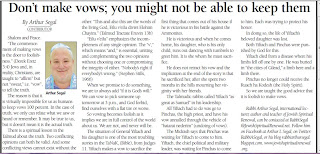Shalom and Peace:
I invite you again to learn about Judaism's advice about daily living from its Talmud.
''The commencement of making vows is the door to foolishness.'' [Derek Eretz 3:4]. Jews and in reality Christians, are taught to 'affirm' but not 'swear,' [i.e. vow], to tell the truth. The reason is that it is virtually impossible as humans to keep vows 100 percent. In the case of truth, we only can relate what we saw or heard or remember. It may be true to us, but it doesn't mean it's the actual Truth.
There is a spiritual lesson in the Talmud about ''The Truth.'' Two conflicting opinions can both be valid. And some conflicting views cannot exist without the other. ''This and also this are the words of the living God, Eilu v'eilu divrei Elohim Chayim [Talmud Tractate Eruvin 13b.]'' Eilu v'eilu emphasizes the incompleteness of any single opinion. The v', which means "and," is essential, uniting and complementing the two opinions without choosing one or compromising the integrity of either. ''Nobody's right if everybody's wrong.'' (Stephen Stills, 1966)
When we promise to do something, we always add:'' If it is God's will.'' We can vow to pick someone up tomorrow at 3 PM, and God forbid, find ourselves with a flat tire or worse.
So vowing becomes foolish as it implies we are in full control of the world about us. We are not, and never will be.
The situation of General Yiftach and his daughter is one of the most troubling stories in the TaNaK, {Bible}, from Judges 11. Yiftach makes a vow to sacrifice the first thing that comes out of his house if he is victorious in his battle against the Ammonites. He is victorious, and when he comes home, his daughter, who is his only child, runs out dancing with tumbrels to greet him. It is she whom he must sacrifice. He does not retract his vow, and the implication at the end of the story is that he sacrificed her, after she spent two months in the hills mourning her virginity with her friends.
The Talmudic rabbis called Yiftach "as great as Samuel," in his leadership. All Yiftach had to do was go to Pinchas, the high priest, and have his vow annulled through the vehicle of "hatarat nederim" (undoing of vows). The Midrash says that Pinchas was waiting for Yiftach to come to him. Yiftach, the chief political and military leader, was waiting for Pinchas to come to him. Each was trying to protect his honor. In doing so, the life of Yiftach's beloved daughter was lost.
Both Yiftach and Pinchas were punished by God for this. Yiftach died from a disease where his limbs fell off one-by-one. He was buried in "the cities of Gilead," a limb here and a limb there. Pinchas no longer could receive the Ruach ha Kodesh (the Holy Spirit).
So we are taught the good advice that it is foolish to make vows.
Rabbi Arthur Segal is an international lecturer, author, and teacher. Visit him at www.JewishSpiritualRenewal.org . Follow him on FaceBook at 'Arthur L Segal', on Twitter at RabbiASegal, or his blog at http://rabbiarthursegal.blogspot.com . Email at RabbiSegal@JewishSpiritualRenewal.net
Jewish Renewal www.jewishrenewal.info
Jewish Spiritual Renewal http://rabbiarthursegal.blogspot.com
Jewish Spirituality
Eco Judaism
facebook.com/RabbiArthurSegalJewishSpiritualRenewal
Hilton Head Island, SC, Bluffton, SC, Savannah, GA














